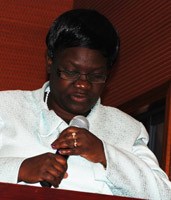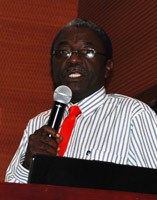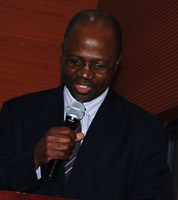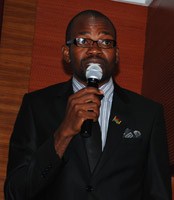How regime change affects the media...
48 hours before the swearing in, the media was operating under oppressive and unfriendly environment - 48 hours later, it was freer than it was imaginably possible.
How democratic governance changes affect media
The World Bank in Malawi on Thursday, 21 June 2012, bankrolled a media conference in Lilongwe that critically looked at how democratic governance changes affect media development.

Acting country manager for the bank, Chrissie Kamwendo said they have always worked with the media and were compelled to fund the conference knowing a vibrant media spur development for the country.
"I have worked in the development arena for more than 15 years and I appreciate the role that the media takes in ensuring transparency," Kamwendo said.
Kamwendo said since the World Bank is also a knowledge institution they appreciate how the media ensures that information reaches the intended audience.
"We are and would to still like be a conduit for knowledge and experience sharing and this is why whenever we can we support the media," she said.
The legal and policy environment
The conference, facilitated by the Malawi Chapter of the Media Institute of Southern Africa (MISA-Malawi) and Media Council of Malawi (MCM), drew together civil society and media practitioners themselves.

Professor of Law at the Chancellor College of the University of Malawi, Dr. Fidelis Edge Kanyongolo looked at democratic governance changes in Malawi and how in such a process, legal and policy issues do affect the media environment and protection of the media in Malawi.
"We have to examine the legal and policy environment and how well protected or endangered the media is as government change," he said.
Media is affected by governance transitions
Kanyongolo observed that given its central role in the promotion of democracy and development, the media is one of the institutions that affects, and is affected by, governance transitions.
Nation on Sunday editor, Gracian Tukula also gave the conference first hand experience of how media house, the Nation Publications Limited (NPL) in particular, has ever been affected by governance changes in the country.
Another University of Malawi lecturer in Media Studies at its Polytechnic College, Dr. Francis Chikunkhuzeni presented a paper that appreciated how the media in developed democracies operate under different regimes.
He compared scenarios in Europe and the United States of America to that which occurred in Malawi.

Chairman of the Media Council of Malawi, Rev. Patrick Semphere said the media conference's spotlight is the media in the context of democratic changes and national development.
Media plays in peace-building
"The idea of this conference was hatched last March after MISA-Malawi chairperson, Anthony Kasunda and I attended a peace-building stakeholder's conference in Mangochi," explained Semphere.
He said at that conference, while commending vital role the media plays in peace-building, the media also received some bashing for more irresponsible cases of the media fueling conflicts.
"In reflection, Anthony and I observed that the impasse between government and civil society at that time, continued to raise the political temperature. Evidently, the media has been battlefield for various players on the ground," he said.
Semphere noted that government was using the state broadcaster, Malawi Broadcasting Corporation (MBC), as their turf while the opposition and civil society hang on to the independent media as their arsenal.
"And history has taught us that the government of the day tends to be at loggerhead with the private media while the opposition often seeks sympathy from the private media," he observed.
In this regard, he said their forecast as media groups in Malawi for the 2014 general elections is very gloomy and this is why they agreed that a stakeholders' conference to brainstorm such challenges like one funded by the World Bank was relevant.
"As a media industry, we take our role as watchdogs very seriously. We the media is doing much better than that. The reason we have gotten trouble with previous regimes is because we were not be silent when public servants are sneaking into the dark carrying suspicious baggage," explained Semphere.
"We will blow the whistle when public resources are going into pockets of few greedy individuals. We will make noise when an honourable member is running around with somebody's wife. And this is where we have burnt our fingers in the past. And fingers shall continue to burn as long as unbecoming practices continue to cross our eyes as watchdogs."
Scrutinising media performance
He explained further that the conference was supposed to scrutinize media performance in Malawi to establish whether or not it was being overzealous in doing their job.
"We are incredibly privileged today that at short notice, we have managed to assemble a team of eminent experts to lead us in critical reflection of our democracy as it hinges on the pivotal role of the media," he said.
"As Media Council," the reverend said "we are delighted to play a role in helping promote journalistic ethics in our country to ensure that the watchdogs are guided by appropriate ethics and professional standards."
Lobbying for resources
He took advantage of the conference to lobby for more resources for the MCM and MISA-Malawi.
He said for the council, it also exists to provide an alternative platform for mediation for those who may have media-related complaints and while they celebrate some achievements that they have recorded in performing their duty as Media Council, their performance has been severely compromised due to lack of resources.
"I am hopeful that the session that discusses Media Council and MISA-Malawi [during the conference] will yield some recommendations on how to strengthen our umbrella bodies so that we don't have watchdogs that are perpetually in sleep mode," said Semphere, who also thanked the World Bank for supporting the conference.

Since Information Minister Moses Kunkuyu was also present in the meeting, Semphere thanked government for what he described as 'demonstrating a tangible measure of seriousness towards a free media as evidenced by the recent repeal of Section 46 and the removal of VAT on newspapers.'
"We hope this momentum shall be sustained as there is yet more ground gained," he said.
In his response the minister observed that the significance and timing of the conference was not lost on government, the civil society and the media players.
"It is not lost because we know that when agreed threatened to plunge Malawi into darkness, just two months ago, it was media that came to the rescue of the nation, through its forthright and truthful reporting of events leading to the transition and democratic change. This is the subject around which this conference today is structured," he said.
Truth and public interest...
Kunkuyu explained further that when truth became a casualty, when truth and public interest were sacrificed at the altar of personal political ambition, the media elected to stand with the ordinary citizen, to whom those in elected public office owe their very existence, or at any rate that they ought to know they do.
"Today, I want to take the opportunity to thank the media, civil society, the academia and the diplomatic community for the role that they played in making sure that the governance changes that took place in the country were smooth and orderly," he said.
He agreed with the objectives of the conference saying it was appropriate at this juncture, to sit together as media practitioners, to reflect on the lessons from the sadness of the last three years of Malawi democracy, in particular from the events that led to the assumption of office of the president by Joyce Banda.
"It is appropriate that this gathering reflects on the role that the media and the other stakeholders here played and should play so that, never again, should the Malawi nation be subjected to any attempt to subvert the Republic Constitution that never again shall another cabal of [Malawi politicians] attempt to pervert the course of justice and constitutionality."
A pluralistic media environment
Kunkuyu said supporting a pluralistic media environment and freedom of expression are integral to Malawi's efforts as government to eliminate poverty, illiteracy and isolation.
"This is also integral to our efforts to foster business and entrepreneurship. It is certainly integral to our efforts to consolidate democracy, human rights and political participation; call it activism if you like. In short, our government is founded on openness and disclosure, rather than concealment," he said.
He said government, has now taken a different posture from that of the previous regimes where it wants to work towards fostering a strong public domain of information and knowledge.
"We shall work to foster strong partnership with the media, both private and public, in policy formulation, content diversity and capacity building," he said.
The government pledges to take this approach because he said it believes that when a media is operating in a free environment it provides a strong cornerstone for human rights to flourish, for development and national building.
"We strongly believe that a strong media is a bridge of understanding and knowledge, that it is essential to the exchange of ideas between peoples and participation in public life. In turn, this dialogue, this exchange of ideas can be the major driving force for sustainable human development," he said.
"It is our view in government that the public good is better served by free and open public choices mediated by self regulated media and market mechanism," he added.
Kunkuyu said the new government's thoughts and approach are guided by the belief that universality, diversity, accessibility and independence are the best foundation of plurality of information.
"Our policy initiatives and reforms will therefore be directed at creating a media environment that gives meaning to these ideals that give meaning to these principles," he pledged further.
Encourage dialogue
He said because of this government commitment, their biggest agenda is not to smother but encourage dialogue.
"We will do everything it takes to get the media back to work as partners, not foes. The repeal of Section 46 reflects this commitment," said Kunkuyu, appointed by president Banda soon after she was sworn in.
Kanyongolo said the media needs to take advantage of the new posture that government has taken considering that governance transitions have the potential to transform the institutional framework within which democracy and development unfold.
He said although the recent transition in Malawi was limited in its impact on the fundamentals of policy and laws, but changes in the governance environment have, nevertheless, changed the environment and priorities and presented opportunities for expediting legal and policy changes that create a more conducive environment for media.
He said the media can now facilitate participation in policy-making, accountability, transparency and effectiveness of the state.
He said now the media should ensure that the executive branch of government should expedite the formulation and adoption of a national media policy whose goal is to promote media freedom, diversity and independence, as well as access of the media to public information.
"The executive branch of government should expedite the introduction of the proposed Access to Information Bill to the National Assembly for debate and enactment," he said.
He added that it should also initiate a review of the Communications Act with a view to enhancing the security of tenure of the management of the Malawi Communications Regulatory Authority (MACRA) and the MBC.
Kanyongolo then advised MCM and MISA-Malawi to urgently before the window of opportunity closes he said, make a written submission to the relevant ministries requesting the expedited adoption of a national media policy and the draft access to information policy, the expedited enactment of the proposed Access to Information Bill and comprehensive review of anti-media laws.
"MCM and MISA-Malawi should urgently, before the window of opportunity closes, lobby the government to make MACRA and MBC more independent in law and in practice by enhancing the security of tenure of boards and CEOs, among others," he said.























